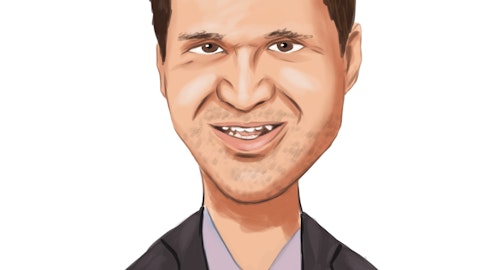Operator: Our next question comes from Sean Dodge from RBC Capital Markets.
Sean Dodge: Thanks. Good afternoon. Maybe just jumping off Jamie on your last point there. So, David, your previous point around license sales was, you had, sounds like some conferences are going to pick back up in Q4. I guess there’s a little bit of softness there in Q3. Was that then from deals that simply slipped from Q3 to Q4, I guess have you actually seen a pickup in this already in Q4? Are those in the pipeline or are you off to a quicker start with those this quarter than you have historically?
David Sides: Yes, Sean, it’s a little bit of a slip. And so, we have high confidence because some of those may have even closed by now. So, it gives you confidence that this quarter looks good, but I do think like I said in an earlier answer, I think next year we’re going to move the license revenue down from our own budgetary expectations because of the lumpiness. And we’re seeing that trend because we’re selling everything as subscription. So, that’s kind of expected. It’s been coming down as we’ve said before for multiple years. It used to be five years ago and now it’s around 30 million. It won’t go to zero, but it’ll keep getting a little bit smaller as all of our new offerings and surround offerings are all subscription. So, that’s where we’re seeing a lot of growth in the business.
Sean Dodge : Okay. That’s very helpful. Go ahead, Jamie.
Jamie Arnold: No, I was just going to say, it is €“ if you look at the longer-term trend, as Dave said 5 or 6 years, you see a very clear trend line. It did change as we started to come out of COVID. We’re just being €“ we’re calling it out, but we have an adequate working set for this quarter. So, we just wanted to highlight it. We try to be transparent.
Sean Dodge : Okay. And then with cross-selling continuing to be an important part. David, you mentioned the strong solutions that being an important part of the growth algorithm going forward. What’s the backdrop like there now? And what I’m trying to get is just the motivation for clients to swap out and consolidate ancillary systems on NextGen, is that €“ it’s kind of the main factor there just your ability to integrate all of these solutions and more seamlessly and present them with kind of one offering? Or is there some element when you bundle all these together, can you just price all of these in a way that’s a little bit more competitive than standalone point solutions could?
David Sides: Yes. So, we think integration wins. So, integration is an easier way to manage the system. So, you have less interfaces between us and maybe point solutions, it’s easier to host, right? So, we can host everything for a client in our in AWS and have an integrated cloud-offering and it’s less from a cyber perspective to protect, as well as less to manage. So, if you’re a , you’re under pressure from a revenue perspective, you’re thinking, okay, I’m going to have less systems. We think the same thing when we’re looking at our own cost internally. We want to simplify the number of suppliers that we work with. And we’ll pick integrated suppliers to do more with fewer people. And as you do more, you expect to see a return there.
Nothing else from your own staff because there’s less systems that they have to know how to work. So, I think that trend is playing out. I think it’s favorable for us from an integrated provider perspective. And it should continue. We see people still wanting to buy these solutions. It’s easier to add one on than it is to go contracts with somebody new and go through that process.
Sean Dodge: Okay. That’s great. Thanks again.
Operator: Our next question comes from Jessica Tassan from Piper Sandler.




